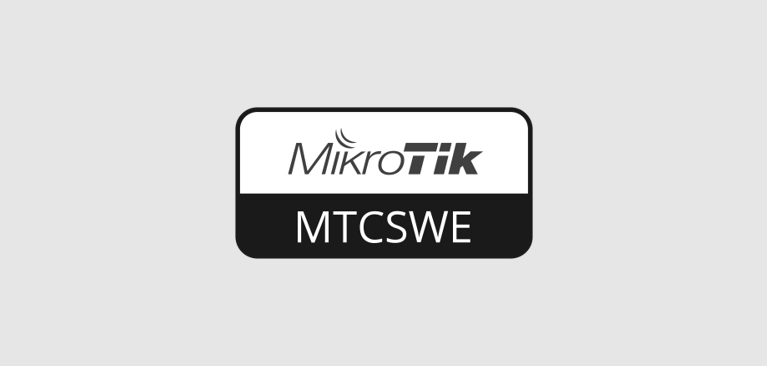
MikroTik Certified Switching Engineer Certification (MTCSWE)
The Mikrotik Training Academy offers interested parties from all over the world the opportunity to gain experience and to find out more about MikroTik products and technologies. The MikroTik training program consists of courses that are held worldwide by official MikroTik certified trainers. Participation in these courses therefore also offers the opportunity to receive professional certification in various MikroTik product technologies.
The Certified Switching Engineer (MTCSWE) course includes knowledge of Layer 2 Forwarding using MikroTik’s technologies. Part of the course are practical exercises with a training kit so that you can apply the knowledge you have acquired straight away. The exam to be passed is a central online test specified by MikroTik.
After passing the exam, you will receive a certificate. By the end of this training, you will be familiar with RouterOS Layer 2 Forwarding software and understand the “RouterBOARD Hardware Switch Chip” and Bridge features. You can configure and manage Layer 2 forwarding with MIkroTik network solutions.
The target group is network engineers and technicians who want to create or maintain Layer 2-based networks.
We recommend preparation on the following topics:
- Layer 2 networking
- Bridging
- Switching
- VLAN
Language : This course is multilingual and is held in German and English.
Kursinhalt
Module 1: Introduction
- Layer 2 forwarding concepts
- Unicast, multicast and broadcast traffic
- MAC learning in bridges and switches
- Interface setting
- RouterOS bridge overview
- RouterBOARD switch chip overview
- RouterBOARDs with basic switch chips
- Cloud Router Switch (CRS) series devices with advanced switch chips
- SwitchOS (SwOS) brief overview
- Module 1 laboratory
Module 2: MTU
- MTU
- RouterOS bridge overview
- L2MTU
- Jumbo frames
- Potential MTU issues
- Module 2 laboratory
Module 3: VLAN
- 802.1Q and 802.1ad VLAN overview and tagging concepts
- RouterOS VLAN interfaces
- Port based VLAN (VLAN bridging)
- Inter-VLAN routing (‘router on a stick’)
- VLANs in basic switch chips
- Port based VLAN
- VLANs in bridge interfaces
- Port based VLAN
- MAC based VLAN
- Protocol based VLAN
- QinQ (802.1ad)
- QinQ implementation with bridge VLAN filtering
- QinQ implementation with VLAN interfaces
- Module 3 laboratory
Module 4: Spanning Tree Protocol
- Spanning tree protocol (STP) concepts
- STP bridge priority
- STP port path cost
- STP and RSTP comparison
- Multiple Spanning tree (MSTP) concepts
- MSTP definition
- MSTP regions
- CST/CIST
- Bridge protocol data unit (BPDU)
- Spanning tree security
- Module 4 laboratory
Module 5: Link Aggregation
- RouterOS bonding
- Bonding modes
- Compatibility with other static link aggregation
- Module 5 laboratory
Module 6: Port Isolation
- RouterOS bridge horizon
- Switch port isolation
- Module 6 laboratory
Module 7: QoS
- Layer 2 QoS (802.1p)
- RouterOS bridge filter priority
- CRS priority configuration
- Traffic shaping
- Bandwidth limiting in bridge with queues
- Bandwidth limiting in switch chip
- Module 7 laboratory
Module 8: Layer 2 Security
- IGMP snooping
- DHCP snooping
- Loop protect
- Traffic storm control
- Layer 2 firewall
- RouterOS bridge filter features
- Switch access control list
- BPDU guard
- ARP modes
- Port security
- 802.1X
- Switch security
- Module 8 laboratory
Module 9: PoE
- RouterOS PoE modes and compatibility
- RouterOS PoE priority settings
- RouterOS PoE monitoring
- Module 9 laboratory
Module 10: Tools
- Layer2 diagnostic tools
- Port mirroring
- Module 10 laboratory
Module 11: SwOS
- Introduction to SwOS
- RouterBOARD dual-boot compatibility
- Installing SwOS
- Managing SwOS
- Configuration of Layer 2 Features with SwOS
- VLANS
- (R)STP
- Port trunking
- QoS
- Layer 2 security
- Modules 11 laboratory
- * Preisangaben: zzgl. der gesetzlichen Mehrwertsteuer
- Voraussetzungen für Teilnahme: MTCNA
- Weitere enthalten Leistungen:
Tagungs-/Schulungsunterlagen, Mittagessen, Pausenerfrischungen
- zusätzliche Information:
Hotelbuchungen sind separat zu tätigen. Die Kursunterlagen sowie der Online-Multiple-Choice-Test sind in Englisch.
Hourly Schedule
Day 1 - Day 3
- 9 clock - 17 o'clock
- Module 1: Introduction
- (For details see course content)
- 9 clock - 17 o'clock
- Module 2: MTU
- (For details see course content)
- 9 clock - 17 o'clock
- Module 3: VLAN
- (For details see course content)
- 9 clock - 17 o'clock
- Module 4: Spanning Tree Protocol
- (For details see course content)
- 9 clock - 17 o'clock
- Module 5: Link Aggregation
- (For details see course content)
- 9 clock - 17 o'clock
- Module 6: Port Isolation
- (For details see course content)
- 9 clock - 17 o'clock
- Module 7: QoS
- (For details see course content)
- 9 clock - 17 o'clock
- Module 8: Layer 2 Security
- (For details see course content)
- 9 clock - 17 o'clock
- Module 9: PoE
- (For details see course content)
- 9 clock - 17 o'clock
- Module 10: Tools
- (For details see course content)
- 9 clock - 17 o'clock
- Module 11: SwOS
- (For details see course content)

